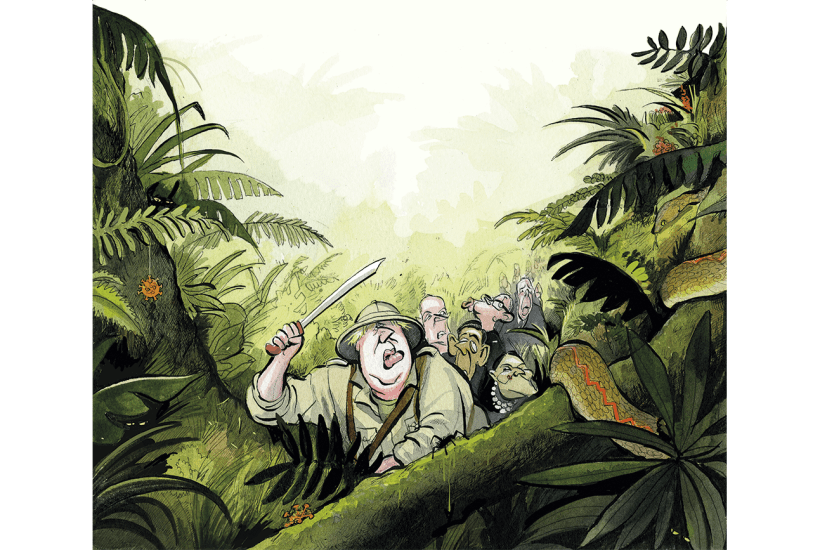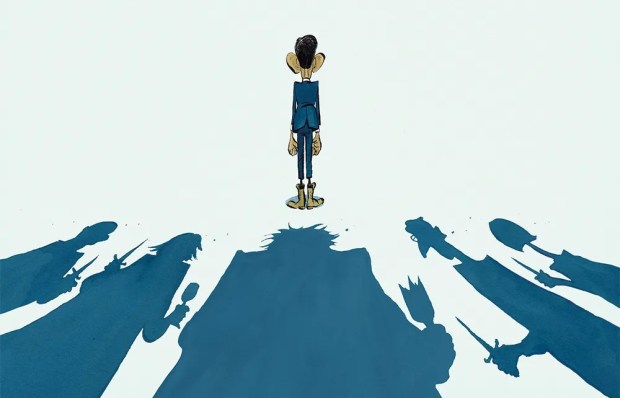The main thing to say about Boris Johnson’s speech at this year’s online Tory conference is that it captures the present mood of the Conservative party almost perfectly. The problem with that is, that mood is one of confusion and soul searching about what the Conservative party actually exists to do.
For a start, there is a need to address the topic of Boris’s missing mojo. This has been talked about to death, and so I will only say that complaints that he wasn’t at his shiny best are a little unfair. He didn’t have a crowd to feed off of today, which in and of itself took the speech’s energy levels down several notches. Also, he’s the prime minister at a time of national crisis. Expecting him to be the buoyant life and soul of the party at this moment is odd to say the least. Part of why the Boris of today isn’t the Boris of old is due to understandable events.
Yet there is still much to criticise in the speech. It is still not clear what Boris Johnson’s Conservative party is about or what it realistically wants to achieve in a Covid stricken world. Too much of Boris Johnson’s speech today belonged to the reality Boris wants to live in, not the one that we actually inhabit at present. Johnson’s Britain remains one where years of tight finances have left the Treasury without money to spend on the prime minister’s pet projects. The speech left us none the wiser about what can actually be delivered in a country that witnessed a 20 per cent drop in GDP growth in a single quarter earlier this year. Boris may want to be optimistic but there was a lot more blue sky in the speech than any take on the present situation warrants.
Then we come to the real problem – is the Conservative party now a big-spending, blue Labour sort of a creature? Or is it still attached to free market ideas in any real sense? Boris invoked Attlee in calling for a ‘New Jerusalem’, and yet at a different point said, ‘There comes a moment where the state must stand back and let the private sector get on with it.’ My reaction to the latter point was to think, ‘If you want to stand back and let the private sector get on with it, we’re all waiting, mate’. It is difficult to square these two ideas – the statist Conservative party we see in front of us versus this vision of an economically liberal Tory government, keeping out of the way of what business wants to do. Boris seems to want to evoke one with words only, while actually carrying out the other.
Were there any positive points to the speech? The prime minister’s idea that the crisis should be used as a catalyst to fix some of the problems that have faced us for years was welcome. ‘After all we’ve been through it’s not enough to go back to normal. We’ve been through too much,’ he said. ‘This thing teaches us that things of this magnitude, like wars, plagues, don’t just come and go. They can be the trigger for economic and social change.’ To that end, Boris talked up Britain becoming the Saudi Arabia of wind power. It’s a good idea, even if it does risk becoming the tagline of the entire speech: there was a lot of wind in there.
The question really is: did Boris’ speech today gain him any traction with anyone who already didn’t like him quite a bit? I’d be surprised if the answer to that is yes. This wouldn’t be so bad were it not for the fact that Keir Starmer’s speech last week, laid out Labour as a party of patriotism and working-class communities once more. With wind power and talk of ‘not going back to normal’, Boris was trying to get a hearing from unusual quarters. The problem is most people who have doubts about Johnson’s leadership don’t want even more spending commitments – they want a coherent, competently laid out plan for how the country gets out of this mess.
On this measure, Boris failed. The prime minister may want to build a New Jerusalem but unfortunately, the moment calls for something a lot less glorious. Time will tell if Boris Johnson is able to steer the country through its current crisis. It will also hopefully tell us what the Conservative party is about these days and what, if anything, it stands for any longer.
Got something to add? Join the discussion and comment below.
Get 10 issues for just $10
Subscribe to The Spectator Australia today for the next 10 magazine issues, plus full online access, for just $10.




















Comments
Don't miss out
Join the conversation with other Spectator Australia readers. Subscribe to leave a comment.
SUBSCRIBEAlready a subscriber? Log in